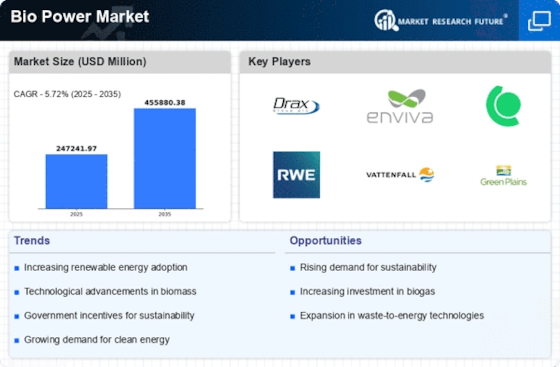The Bio Power Market is characterized by the presence of many regional and local players. The market is competitive, with all the players continually competing to gain a larger market share. To stay competitive, market players engage in various strategies, including new product launches, partnerships, mergers and acquisitions, and expansion into new markets. They invest in research and development to enhance product performance, improve efficiency, and meet evolving customer demands. Moreover, players focus on building strong distribution networks and establishing long-term relationships with customers to ensure a steady market presence. The growth of the vendors is dependent on market conditions, government support, and industrial development. Thus, the vendors should focus on expanding their presence and improving their services. Drax Group:Drax Group is a leading renewable energy company that generates renewable energy. The company produces sustainable biomass and sells renewable electricity to commercial customers. It is the UK's primary source of renewable energy. The company operates its business in sustainable biomass, hydroelectric, and pumped hydro storage assets. The business portfolio of the company is flexible, low-carbon, and renewable UK power assets that provide the energy grid with dispatchable, renewable power and system support services. Drax Group has four generation facilities in England and Scotland. In addition, the company maintains a global bioenergy supply business with 13 manufacturing facilities in the United States and Canada, producing compressed wood pellets for its usage as well as customers in 38 locations across Europe and Asia. BP PLC:BP PLC, an integrated oil and gas company, has a diverse range of operations that include exploration, production, transportation, refining, and marketing of oil, natural gas, and petroleum products. The company’s operations can be categorized into three segments: upstream, downstream, and Rosneft. The upstream segment focuses on exploration, development, and production of oil and natural gas. The downstream segment involves refining, manufacturing, marketing, and trading of crude oil, petroleum, petrochemical products, and related services. The Rosneft segment represents BP's equity investment in Rosneft, a Russian oil company. Moreover, BP PLC has also made efforts to expand its presence in renewable energy, including bio power. For instance, the company has announced a major expansion in renewable energy by combining its Brazilian biofuels and bio power businesses with Bunge, creating BP Bunge Bioenergia. This venture aims to be a world-scale, highly-efficient producer of sugarcane ethanol in Brazil, contributing to BP's biofuels business. Furthermore, the company has its operations worldwide including Europe, Asia Pacific, Americas, and Africa & Middle East.
Bio Power Industry Developments
July 2022: Drax and MOL Drybulk collaborated to create wind power technologies that will cut biomass shipping emissions by one-fifth. MOL's Wind Challenger hard sail technology will be used on new vessels, with the first ship scheduled as early as 2025. The program is part of Drax's plans to use bioenergy with carbon capture and storage (BECCS) to cut supply chain emissions and achieve carbon negative by 2030. July 2023: BP PLC is strengthening its investment in bioenergy by partnering with US biofuels developer WasteFuel. In a move to support the development of a global network of plants, BP has invested USD 10 million in WasteFuel. The objective of this collaboration is to convert municipal and agricultural waste into bio-methanol, a biofuel that has the potential to play a crucial role in decarbonizing challenging sectors such as shipping. Recently, Drax Group partnered with Molpus Woodlands Group in February 2024. In so doing, they can acquire a source of sustainable woody biomass. The concept behind this biomass is to use it as fuel for the company’s bioenergy operations combined with Carbon Capture and Storage (CCS) plants located in the southeastern US. On December 2023, MVV Energie AG, based in Mannheim, signed a letter of intent alongside Reutlinger FairEnergie GmbH, Stadtwerke Tübingen GmbH and Stadtwerke Balingen. This agreement involves the establishment of a project company that will facilitate the construction, funding and subsequent operation of a biogas upgrading plant within Meßstetten town, which is located in Zollernalb district Baden-Württemberg; Evero Energy Group Limited – previously known as Bioenergy Infrastructure Group—announced that Mitsubishi Heavy Industries Ltd. (MHI), one of the global industrial leaders, had become its strategic partner The Ince bio-power site owned by Evero Energy will be sited at an InBECCS Project—a wood-waste-fired power station near the Hynet industrial cluster in north-west England. Therefore, introducing the InBECCS scheme at Ince is an important step toward achieving its sustainability goals. In 2030, reducing aviation emissions by 20%, and backing three billion gallons of renewable fuels from sustainable feedstock, among other proposals and undertakings, have been limited because of the US government’s restrictions while supporting their agriculture & manufacturers through extra income to producers but helping the Government in climate change mitigation. According to EPA estimates, several landfills could effectively support gas-to-energy projects, and EPA has also established a Landfill Methane Outreach Program, which was created to cost-effectively reduce methane emissions from landfills while promoting eco-friendly as well as economically beneficial landfill gas-to-energy projects.


















Leave a Comment